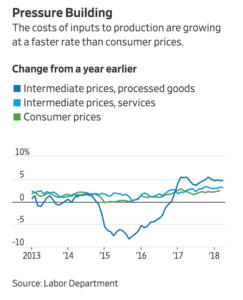
Photo: consumerreports.org
As we predicted one result of import taxes (blog of January 24) the Administration placed on imported washers was that domestic suppliers would raise prices. Sure enough they have raised prices by 7 – 15 % at a time when consumers are squeezed. As tariffs were placed on imports we forecasted that domestic manufacturers would take advantage of the higher competition prices and raise their prices as Maytag and Whirlpool have done. Their spokesman say they had to raise prices due to increasing costs of steel and aluminum yet they have raised prices before the steel tariffs went into effect. Once again corporations lobbied government to change the rules in their favor to make more profits while consumers lose.
Other manufacturers for processed goods, food and items with a high shipping cost are raising prices as well.

Sources: Labor Department, The Wall Street Journal – 5/9/18
Of major concern is a combination of higher interest rates, tariffs and competition will cause increases in producer prices that companies will not be able to pass along to consumers. Consumers are too indebted to accept the price increases. Margins are squeezed, companies lose sales, and a recession begins. Possibly the wealthy can continue to purchase major appliances and processed items but the middle class will not.
Next Steps –
The middle class is caught in the cross fire of competing interests in our economy where the Federal Reserve did keep interest rates artificially low increasing the value of financial assets like stocks, homes and consumers were able take on too much debt. The real assistance would be for the federal government to invest in jobs training, career development, Heartland regional economies, African American and Hispanic community development, welcome immigrants, and end stock buybacks. Corporations could allocate the $1 trillion in cash they are holding in accounts mostly overseas and invest in their employees – raising their wages, productivity research, decent family leave programs and giving them more voice in corporate decision making.
